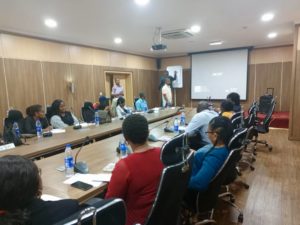A nongovernmental organization that promotes public safety, security, and justice through empirical research, legislative advocacy, and demonstration program in partnership with the government, civil society, and private sector, CLEEN Foundation, has launched a civil society observatory platform towards efficient implementation and compliance with the Administration of Criminal Justice Law (ACJA).

A Cross Section of participants at the event
The launching was held Wednesday June 21, 2023′ at Best Western Plus – Elomaz Hotel, Asaba, Delta State, and was attended by representatives from different civil societies in the state
The observatory platform aims to facilitate the exchange of ideas for problem-solving between the civil society observatory and Criminal Justice Actors for the smooth implementation of ACJA in the focal states, effective tracking of compliance level to ACJA against the backdrop of the minimum standards, and efficient documentation of court proceedings on corruption-related cases to underscore strict compliance to the provisions of ACJA/ACJL, and deepening and institutionalization of continuous learning on the ACJA/ACJL..
Speaking at the event, the Executive Director of the CLEEN Foundation, Mr. Gad Peter stated that the main objectives of the ACJA as found in Section 1 of the Act, are to promote efficient management of criminal justice institutions, provide speedy dispensation of justice, and protect the society from crime while defending the rights and the interest of the defendant and the victim. According to him, these indicate a deliberate shift from punishment which is the main goal of criminal justice to restorative justice which pays attention to the needs of society, the victims, vulnerable persons, and human dignity.
Mr. Peter stated that the establishment of the civil society observatory group on the Administration of Criminal Justice Reform is to independently monitor the compliance rate of stakeholders to the unique provisions of the ACJA/L, as a critical step towards promoting transparency, accountability, and the rule of law in the country. Adding that it requires a strong commitment from stakeholders, the development of a clear governance structure, and a focus on achieving tangible outcomes.
He also added that the group would be composed of a diverse range of stakeholders including civil society organizations, human rights groups, legal experts, and other relevant stakeholders, while saying that for Nigerian citizens to enjoy the benefits of the revolutionary ACJA 2015 and the ACJL in various states, criminal justice actors must be ready to fully comply with their roles and responsibilities as stipulated in the Act.
According to the Executive Director, Civil Society Organizations (CSOs) play a critical role in holding the government accountable because they are advocates and watchdogs for the promotion of human rights and adherence to the rule of law, and act as mobilizers and educators of the public.
“In recent years, state and federal governments in Nigeria have not been receptive to civil society engagement. Many CSOs lacked the skill required to take part in policy decisions or monitor government processes through the observatory platforms, we will keep an eye on the abuse of court processes, unprofessional conduct of judges, courts attendants, and law enforcement personnel, outdated processes, and procedures leading to other challenges such as arbitrary and unlawful arrest/detentions and congested prisons, increasing numbers of awaiting trial/death row inmates, the vicious circle of impunity, incessant delays in case hearing caused by prolonged adjournment.”
“CLEEN Foundation worked with CSOs and the government to become allies in the implementation of criminal justice and anti-corruption reforms. Cleen Foundation will support CSOs to improve their capacity to effectively engage with the government in policy advocacy and coalition building. The goal is to advocate for the institutionalization of continuous learning on ACJA and the issuance of ACJL practice directions and relevant guidelines by the state Chief Justices to guide the implementation of the laws in the focal states by criminal justice actors in the focal states.”
The Executive Director further stated that the observatory platform will focus on training and mentoring by supporting opportunities for CSOs to engage in dialogue with the government, to deepen the tools developed and initiated under phase one of the project to improve accountability and transparency in Nigeria’s criminal justice system, which was highlighted as necessary at the end of the project evaluation report.
He added that the initiative aims to bring together civil society organizations and stakeholders to foster collaboration, advocacy, and knowledge exchange for efficient implementation and compliance with ACJA/L in the country covering eight focal states – Bauchi, Jigawa, Sokoto, Kwara, Cross River, Edo, and Delta State respectively. Adding that the CSO Observatory will be a pressure group, collectively identifying and responding to emerging issues within the criminal justice system in the focal states.
“I am quite confident that this intervention by CLEEN Foundation will contribute robustly towards the efficient implementation and compliance with the administration of the criminal justice Act/Law in the project states. It would strengthen their capacity and capability for improved mandate delivery in a professional, transparent, and just manner to rid the focal states and Nigeria of judicial-enabled corruption and impunity in the criminal justice sector. We urge everyone in the room to fully support this project by constantly reporting compliance gaps with ACJA provisions using the Uwazi web platform via http//cleen/uwazi. oi,” the Executive Director added.












